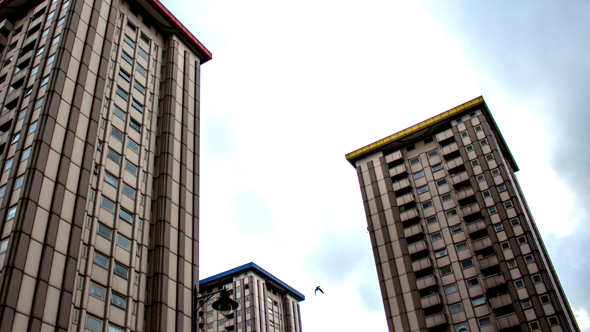
In The Hitchhiker’s Guide to the Galaxy, ‘Wonko the Sane’, a marine biologist from California, finds himself confronted with a pack of toothpicks with printed instructions on them. Wonko is moved to redraw the boundary of the asylum to encompass the whole world – except his home, which he turns inside out and classifies as the only place outside the asylum. “It seemed to him,” wrote Douglas Adams, “that any civilisation that had so far lost its head as to need to include a set of detailed instructions for use in a package of toothpicks was no longer a civilisation in which he could live and stay sane.” He resolves to never enter the asylum again.
Every day millions of us shuffle to meaningless jobs, or are commanded to search for them, in a collective act analogous to mass occupational therapy: thousands of Nurse Ratchets, in council offices, MP surgeries and Job Centres, massage our behaviour, preventing us from ever locating the mechanisms at the root of our suffering. Parallel to our being managed, we witness the expression of collective madness that is the joyless hedonism of Leicester Square on a Saturday night. Beneath a tissue-thin layer, we conceal an existential dread that for far too many erupts into a disruptive and harmful breakdown.
The asylum is here, and we all live in it.
It is becoming clearer to more and more people that none of the institutions which claim to represent us are ever going to act in the interest of communities. The reaction to this situation has been varied, but one positive outcome has certainly been the establishment and proliferation of groups which sit somewhere between direct action organising, social case work and collective therapy. Housing Action Southwark & Lambeth, a group I organise with, is one example.
The group came into being as a response to a lack of safe or affordable housing across London. It attempts to organise horizontally, holds meetings twice a month to deal with people’s immediate housing concerns and attempts to plan for more long term resistance to the ongoing gentrification of the two boroughs.
Alongside the far too familiar and unsettling stories of institutional failure which those who attend share during the meeting, an even more universal and almost incidental experience finds its voice within the group: suffering. The right to a secure, attainable home is a key factor in a person’s wellbeing, and when it is threatened, the ability to maintain a stable mental state is seriously tested. With a strong desire to be heard and finding harbour in a safe space, these experiences regularly flow into the agenda of a group meeting.
True to capitalist realism is the denial of all possibilities that imagine a life free from capital. Those who do will find themselves confronted with accusations not wholly dissimilar to those pathologised by the psychiatry industry: Job Centre appointment attendees find themselves, like psychiatric patients, referred to as ‘service users’. Accusations of delusional and fanciful thinking are levied at those who refute the ‘common sense’ of capital: the ‘loony left’ is an insult wheeled out almost daily in some media or another. A subject that transgresses this is regarded as deserving of discipline and control, essential to remedying such ‘aberrant behaviour’.
The first stage of any organising of this kind, therefore, becomes an act of communal health care, where we must aim to provide a safe enough space for these expressions to be communicated, experienced and shared. Relative strangers regularly feel comfortable discussing the kind of details that would normally be shared in the confines of a doctor’s surgery, or only with close friends and family. In sharing these experiences, people become less isolated and are able to come to the realisation of just how many people in their communities are experiencing the same kind of distress.
The nature of these discussions differs in some very important ways from institutionalised therapy in the healthcare industry. Firstly, people are able to express themselves within the material context of their suffering. Their distress isn’t simply abstracted through the prism of medicine or even philosophy, but the tangible causes of their environment are able to be intrinsically linked and dealt with. Power balances between the person seeking help and those attempting to provide it, are also greatly reduced. Whilst inequality based on race, gender, sexuality, class, (dis)ability and so on still exist and must be challenged, the main power imbalance – that of doctor and patient (a distinction that the psychiatric profession uses without qualification) – is not in play. No-one is an expert, capable of disciplining the other.
This process isn’t easy. Some of the most successful projects of those in power in the past few decades have been to erode class consciousness and basic notions of solidarity within communities. These things are going to require time and vast effort to rebuild, but they’re utterly essential. Any successful organisation will have to engage with the effects of mental distress on today’s subjects. After all, at a stage in capitalism’s development which demands we not just surrender our bodies, but our minds for value extraction, it’s paramount that we demand collective representation of the psychosocial as well.
By Jack Dean | @Jacqueimo









